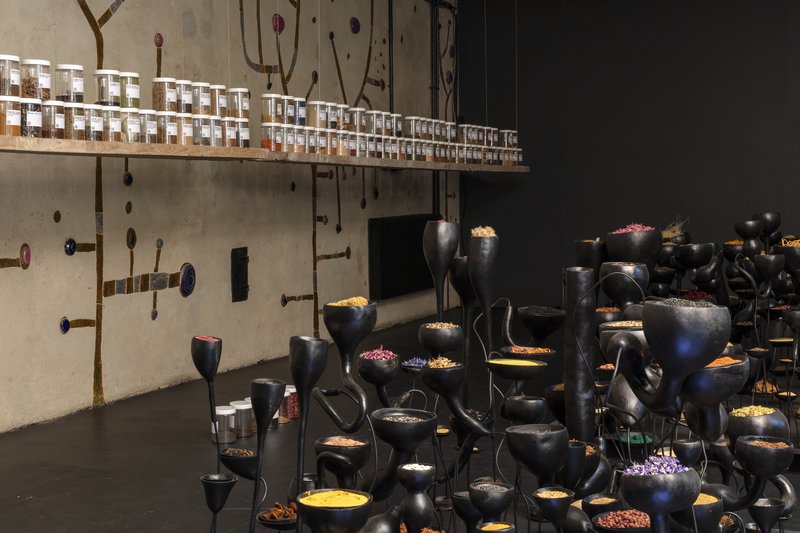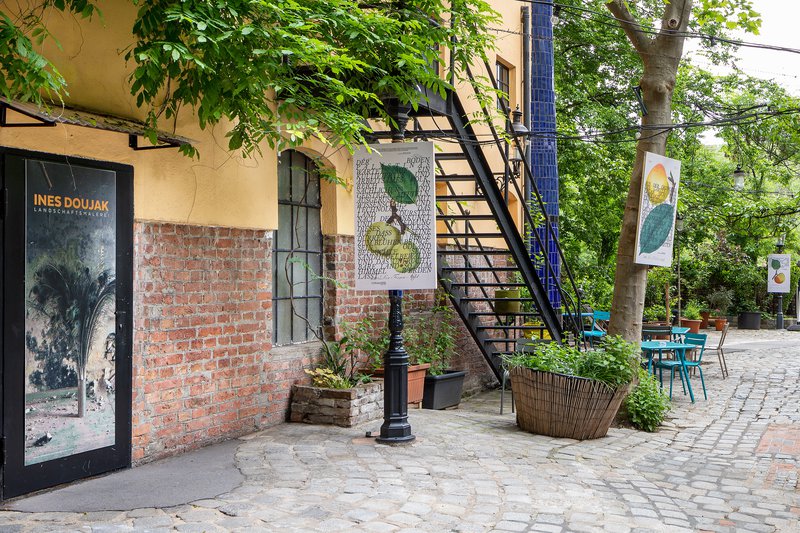Ines Doujak
Landscape Painting
Renaming plants with biographies of revolutionary women
For her exhibition project, the artist Ines Doujak works with an extensive collection of materials from nature such as plant seeds, leaves, clay or stones. A friend collected these over decades and left them to her after his death. Especially for the exhibition, Doujak developed the installation Landscape Painting and works with the natural archive at her disposal as artistic material. The standardised classification and naming of plants according to the Swedish naturalist Carl von Linné often went hand in hand with the colonisation and strategic exploitation of nature. The artist counters this system by renaming over 100 plants with the names of revolutionary women from history and the present, including the Brazilian women's rights activist Maria da Penha, the Philippine guerrilla commander Felipa Culala alias Dayang-Dayang and the Afghan rapper Paradise Sorouri.
 Ausstellungsansicht: Ines Doujak. Landschaftsmalerei, 2021 © Markus Wörgötter
Ausstellungsansicht: Ines Doujak. Landschaftsmalerei, 2021 © Markus Wörgötter
Land grabbing and destruction of biodiversity
Closely linked to colonialism and highly topical is the theme of "land grabbing". Doujak deals with the appropriation of land in a work in public space. As a nature trail, she installs panels with historical representations of apple varieties in the inner courtyard and in the surrounding space of KUNST HAUS WIEN. These refer to the destruction of biodiversity associated with land grabbing, for example through monocultural agriculture. Original quotes from land robbers are covered on the illustrations. They show the unscrupulous expropriation and displacement of predominantly rural populations worldwide, mostly by internationally operating corporations and investors from the global North, but also by governments and state institutions of the rich industrialised nations.
 Installation view: Ines Doujak, Landraub, since 2018
Installation view: Ines Doujak, Landraub, since 2018
Landscape Painting
With the title of the exhibition, Ines Doujak refers to the subjective, yet culturally shaped perception of nature and to the artistic genre of landscape representation as a form of appropriation with the means of aesthetics.
Biography
Ines Doujak, born 1959 in Klagenfurt, studied at the University of Applied Arts in Vienna. In her works, the artist thematises and deconstructs political, social and ecological systematics such as racism, sexism, oppression and abuse of power. Her work is widely acclaimed internationally and exhibited at biennials and museums, such as NTU Centre for Contemporary Art Singapore (2020), Bergen Assembly (2019), Lentos Museum, Linz (2018), Centro de Iniciativas Culturales de la Universidad de Sevilla (2018), Steirischer Herbst (2018), at the Bunkier Sztuki Gallery of Contemporary Art, Kraków (2017), at the MACBA, Barcelona (2015), at the Biennial São Paulo (2014), at the Royal College of Art, London (2013), at the Busan Biennial, Korea (2012), at the Museo Nacional Centro de Arte Reina Sofía, Madrid (2010) or at documenta 12 in Kassel (2007). Ines Doujak lives in Vienna.
Seeds Renamed
Seed Collection
In the context of the exhibition, Ines Doujak questions the classification and naming of plants shaped by colonisation. In response, the artist gives the materials new names that refer to revolutionary women from history and the present. Doujak also writes short biographies of these women.


